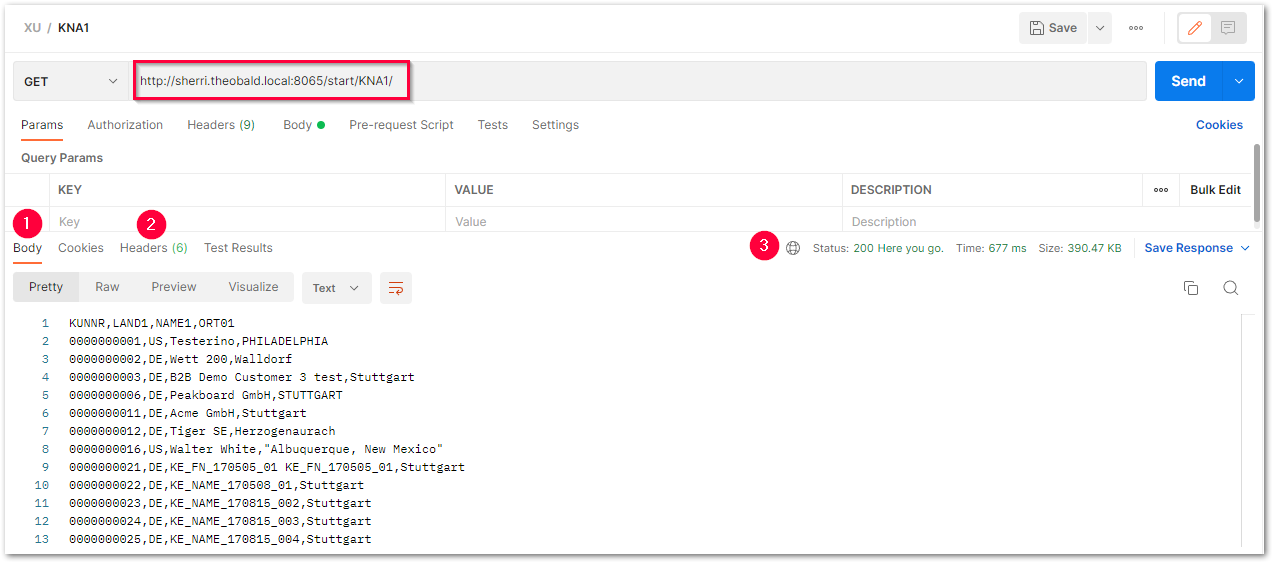For testing purposes extractions can be called via web service. Calling extractions is usually done via script, scheduler or BI-tool.
Base URL Format #
The basic URL for web calls uses the following format: [protocol]://[host or IP address]:[port]/.
Examples
| Protocol | Syntax | Example |
|---|---|---|
| HTTP | http://[host].[domain]:[port] |
http://sherri.theobald.local:8065 |
| HTTP | http://[host]:[port] |
http://localhost:8065 |
| HTTPS | https://[host].[domain]:[port] |
https://sherri.theobald.local:8165 Requires a dedicated host name and X.509 certificate, see web server settings. |
Note: Make sure to use the correct ports, see Server Ports.
Run Extractions #
[protocol]://[host]:[port]/run/[extraction_name]
Runs the specified extraction and waits for it to finish.
[protocol]://[host]:[port]/start/[extraction_name]
Runs the specified extraction asynchronously and returns the run status immediately.
Note: If the extraction is part of an extraction group, enter the name of the extraction group before the name of the extraction.
Separate groups with a ‘,’.
Example: The extraction “KNA” is part of a group “Tables”. Use the following command to run the extraction:
http://sherri.theobald.local:8065/start/Tables,KNA1/
Warning! Deprecated Endpoints:
[protocol]://[host]:[port]/?name=[extraction_name] (synchronous)
[protocol]://[host]:[port]/?name=[extraction_name]&wait=false (asynchronous)
Tip: You can use the UI in the “Run Extraction” menu to generate an URL for extraction runs, see Run Extraction.
Response
The response of the web service calls contains the following information:
| Response | Description | |
|---|---|---|
| (1) | HTTP status code | The HTTP status code 200 indicates a successful extraction call. It does not indicate a successful execution of the extraction. The HTTP status code 404 indicates that the called extraction does not exist. Detailed information can be found in the log of the web service. |
| (2) | HTTP header | Shows the timestamp of the extraction in the HTTP header e.g., X-XU-Timestamp: 2021-04-09_19:03:09.971 |
| (3) | HTTP response body | The Response in the HTTP body depends on the destination type of the extraction. Depending on the destination type, the extracted data is returned in either CSV or JSON format. |

Parameters
[protocol]://[host]:[port]/start/[extraction_name]
| Parameter | Description |
|---|---|
/&[parameter1_name]=[value] |
Runs the specified extraction and passes values to the specified extraction parameters. |
/&quiet-push=true |
Runs the specified extraction and suppresses the output of extraction logs for push destinations. This parameter has no effect on pull destinations and asynchronous extractions. |
Example
http://sherri.theobald.local:8065/start/KNA1/?name1=heobald%20Software&city=Stuttgart
Click here to show the response body
KUNNR,LAND1,NAME1,ORT01
0000000779,DE,Theobald Software,StuttgartAbort Extraction #
[protocol]://[host]:[port]/abort?name=[extraction_name]
Aborts the specified extraction. If the abortion is successful, a confirmation message is returned in the HTTP body.
Note: If the extraction is part of an extraction group, enter the name of the extraction group before the name of the extraction.
Separate groups with a ‘,’.
Example: The extraction “KNA” is part of a group “Tables”. Use the following command to run the extraction:
http://sherri.theobald.local:8065/start/Tables,KNA1/
Example
http://sherri.theobald.local:8065/abort?name=KNA1
Click here to show the response body
All runs of extraction 'KNA1' aborted.